 Everything you need to know about today’s media coverage of Israel and the Mideast.
Everything you need to know about today’s media coverage of Israel and the Mideast.
Sanctions on Iran constrain Israeli military action, Canadian “chutzpah” in Ramallah, and a study lauds Israel’s social resiliency during the Second Intifada.
Join the Media Cheat Sheet Page on Facebook.
Israel and the Palestinians
• According to Haaretz, the government and army have outsourced its own monitoring of Palestinian media to to NGOs like and Palestinian Media Watch and Memri.
The IDF denies the allegation, while government officials confirm that they follow these groups. Nobody questions the accuracy of PMW or Memri‘s work, though Haaretz’s hot air spinning them as “right-wing” insinuates otherwise.
That said, the Israeli govt must be able to monitor the Arab media 24/7 in real time. NGO watchdogs can offer depth and nuance to supplement the government’s work. But believe me — they don’t have the resources to replace it.

• The Canadian ministers of foreign affairs and finance visited Mahmoud Abbas. Is Globe & Mail reporter Patrick Martin’s attitude one of admiration or consternation?
Foreign Affairs Minister John Baird and Minister of Finance Jim Flaherty journeyed to the West Bank on Monday to beard the Palestinian lions in their den.
Over lunch with Palestinian Authority President Mahmoud Abbas, then later with Prime Minister Salam Fayyad and Foreign Minister Riad Maliki, the Ottawa tag-team went out of its way to impress upon the Palestinian leadership that it should abandon its efforts to obtain United Nations recognition and return to the negotiating table with Israel “without preconditions.”
It was chutzpah of the highest order.
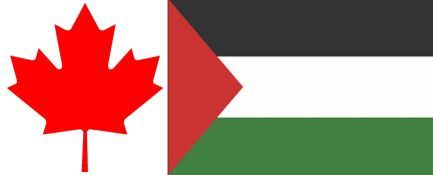
• CNN‘s Kevin Flower visits the Bedouin village of Al-Hadidya, where one of the elders moans about Israeli restrictions on Bedouin life. Flower quotes the army’s response about land theft and illegal building which the Bedouins deny. In the end, you’re left with nothing more than he said/she said journalism.
• With all due respect to Frank Jacobs (NY Times), I don’t see any lessons Jerusalem can learn from other cities split by international borders. Berlin, Nicosia, Laredo/Nuevo Laredo, Valga/Valka, and Mitrovica all have unique political and demographic issues.
Iranian Atomic Urgency
• While Israel’s window of opportunity for striking Iran is closing, international sanctions are constraining military action. AP talked to some nervous Israeli officials:
The European Union this month decided to stop importing oil from Iran — just weeks after the U.S. approved, but has yet to enact, new sanctions targeting Iran’s Central Bank and, by extension, its ability to sell its oil.
Several officials at the heart of the decision-making structure, speaking on condition of anonymity because they were discussing some of Israel’s deepest secrets, said they feel compelled to give the sanctions time.
In this way, somewhat paradoxically, the new economic sanctions the U.S. and Europe are imposing — while meeting a repeated Israeli request — have emerged as an obstacle to military action.
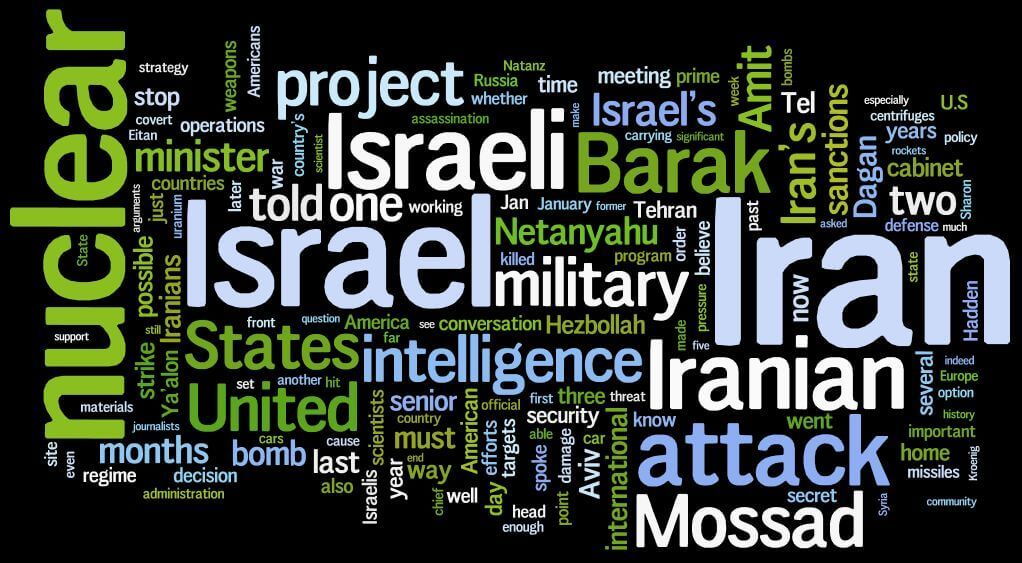
• Jimmy Carter to Time: No big deal if the mullahs have one or two atomic bombs:
Q: What do you think it means that Iran seems to have its first nuclear fuel rod?
A: Well, of course, the religious leaders of Iran have sworn on their word of honor that they’re not going to manufacture nuclear weapons. If they are lying, then I don’t see that as a major catastrophe because they’ll only have one or two military weapons. Israel probably has 300 or so.
David Harris responds:
. . . Carter should go back and read the words of Hashemi Rafsanjani, the former Iranian president, who said: “[T]he use of even one nuclear bomb inside Israel would destroy everything.”
For Carter to imply that Israel is safe and secure from Iranian nuclear designs by dint of having more bombs is, well, naïve, all the more when Iran’s defining eschatology is added to the picture. If religious fervor should trump rational behavior in Tehran, all bets are off.
• Iran’s weaseling around sanctions by using foreign ships to smuggle weapons and exploiting legal loopholes
Arab Spring Winter
• In a NY Times op-ed, a pair of human rights activists call for drone flights over Syria to monitor the violence:
We could record the repression in Syria with unprecedented precision and scope. The better the evidence, the clearer the crimes, the higher the likelihood that the world would become as outraged as it should be . . .
It may be illegal in the Syrian government’s eyes, but supporting Nelson Mandela in South Africa was deemed illegal during the apartheid era. To fly over Syria’s territory may violate official norms of international relations, but governments do this when they support opposition groups with weapons, money or intelligence, as NATO countries did recently in Libya. In any event, violations of Syrian sovereignty would be the direct consequence of the Syrian state’s brutality, not the imperialism of outsiders.
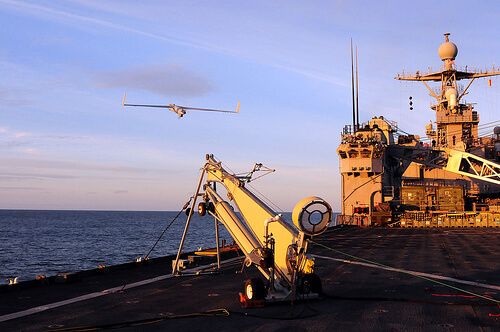
• Michael Weiss weighs in on the latest from Syria.
• An Al-Qaida-inspired group is holding hostage 25 Chinese nationals in the Sinai. According to AP:
The group is demanding release of militants jailed for a 2005 bombing in Sharm el-Sheikh at the tip of the Egyptian Sinai.
Rest O’ the Roundup
• In yesterday’s Cheat Sheet, I noted the Financial Times for picking up on a study which ranked Israel as one of the top three cyber-secure countries. A summary of the report‘s online at McAfee (full report in PDF).
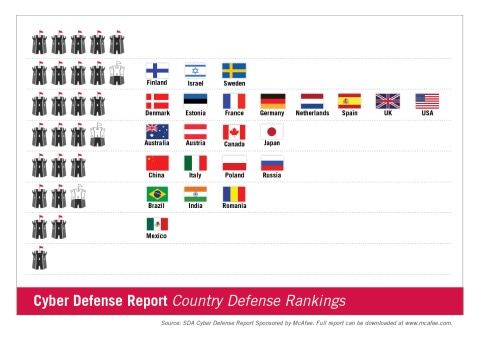
• If terror attacks during the Second Intifada were meant to demoralize Israel, they failed more miserably than anyone realized. The Media Line picked up on a study (in full) finding that Israeli “life satisfaction” never wavered:
“Terrorism is meant to demoralize. You want the Israelis to feel miserable. They have political motives, too, to change our mind on settlements or borders what have you, but there is a psychological element is very important,” he told The Media Line. “What was amazing is that we found daily fluctuations in the weather have more an effect on life satisfaction than terrorism.”
The study offers two possible explanations for the findings:
-
“One is that people respond positively when they feel that their government is taking steps to curb terror.”
-
“But another factor is what researchers call “social resiliency.” Terror is part of the fabric of everyday life with inspections at the front of restaurants and other public places and evacuation for suspicious objects. “Terrorism has become expected and therefore the reaction to it is muted,” Zussman and his colleagues conclude in the paper.”
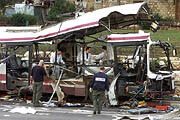
Haifa bombing, 2001
(Image of Scan Eagle via Flickr/US Navy, bus bombing via Wikimedia Commons/Reuters/Nir Elias)
For more, see Monday’s Media Cheat Sheet.

